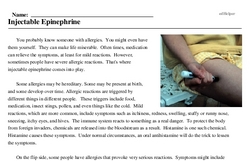Injectable Epinephrine
You probably know someone with allergies. You might even have them yourself. They can make life miserable. Often times, medication can relieve the symptoms, at least for mild reactions. However, sometimes people have severe allergic reactions. That's where injectable epinephrine comes into play.
Some allergies may be hereditary. Some may be present at birth, and some develop over time. Allergic reactions are triggered by different things in different people. These triggers include food, medication, insect stings, pollen, and even things like the cold. Mild reactions, which are more common, include symptoms such as itchiness, redness, swelling, stuffy or runny nose, sneezing, itchy eyes, and hives. The immune system reacts to something as a real danger. To protect the body from foreign invaders, chemicals are released into the bloodstream as a result. Histamine is one such chemical. Histamine causes these symptoms. Under normal circumstances, an oral antihistamine will do the trick to lessen the symptoms.
On the flip side, some people have allergies that provoke very serious reactions. Symptoms might include swelling of the face or mouth, difficulty swallowing or speaking, wheezing or difficulty breathing, abdominal pain, nausea, vomiting, dizziness, or fainting. When all of the problems begin at once, blood pressure drops, breathing tubes narrow, and the tongue can swell. This is anaphylaxis. This reaction is so severe that it can be fatal. Usually, a reaction like this is provoked by an allergy to food, such as peanuts, seafood, or eggs, medication, insect venom, or latex. The reaction can occur within minutes of contact.




